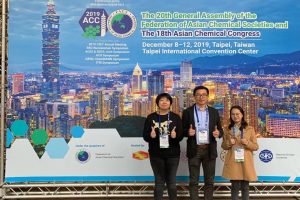Two research studies from the University of Macau’s (UM) Institute of Chinese Medical Sciences, one about an artificial heparin receptor and the other about a novel nano-platform, were both ranked among the top 40 and received the Best Prizes ChemCompetition at the 18th Asian Chemical Congress and the 20th General Assembly of the Federation of Asian Chemical Societies. One feature of the first study was ranked among the top 10 and received the Best of the Best Prizes ChemCompetition.
The first study, titled ‘In Vivo Heparin Reversal by a Guanidinium Calixarene Derivative’, was conducted by doctoral student Huang Qiaoxian, who is a member of Prof Wang Ruibing’s research group. In the study, Huang invented an artificial heparin receptor that is highly biocompatible and can effectively reverse heparin toxicity via supramolecular sequestration in several in vivo bleeding models. Heparin is widely used as an anticoagulant in clinical practice, but excessive heparin often causes internal bleeding and increases the risk of neurovascular and cardiovascular complications. Therefore, safe and effective heparin neutralisers are urgently needed. Huang’s work not only provides a conceptual solution, but also offers important new insights for the design and development of heparin reversal agents.
The other award-winning study, titled ‘Decoating-Induced Activation of Toxic Nanoparticles for Herbicidal, Antibacterial and Antitumor Applications’, was conducted by master’s student Cheryl Kwong, under the guidance of Prof Lee Ming-Yuen and Prof Wang Ruibing. In this study, Kwong fabricated natural polysaccharides coated toxic nanoparticles based on supramolecular host-guest interactions. She demonstrated that this novel nano-platform may have many applications. For instance, it can be used as a user-friendly herbicide, a selective antibacterial agent, or an antitumour nanomedicine.
The event attracted more than 2,000 scientists and industry practitioners from over 50 countries, including representatives of prestigious institutions such as the International Union of Pure and Applied Chemistry, American Chemical Society, the Royal Society of Chemistry, and Wiley’s Asian Chemical Editorial Society. It aims to provide a platform for the exchange of information on chemistry research and the sharing of knowledge and experience among experts and scholars from around the world.
Source: Institute of Chinese Medical Sciences
Media Contact Information:Communications Office, University of Macau
Albee Lei Tel:(853) 88228004Kelvin U Tel:(853) 88224322Email:prs.media@um.edu.moUM Website:www.um.edu.mo

